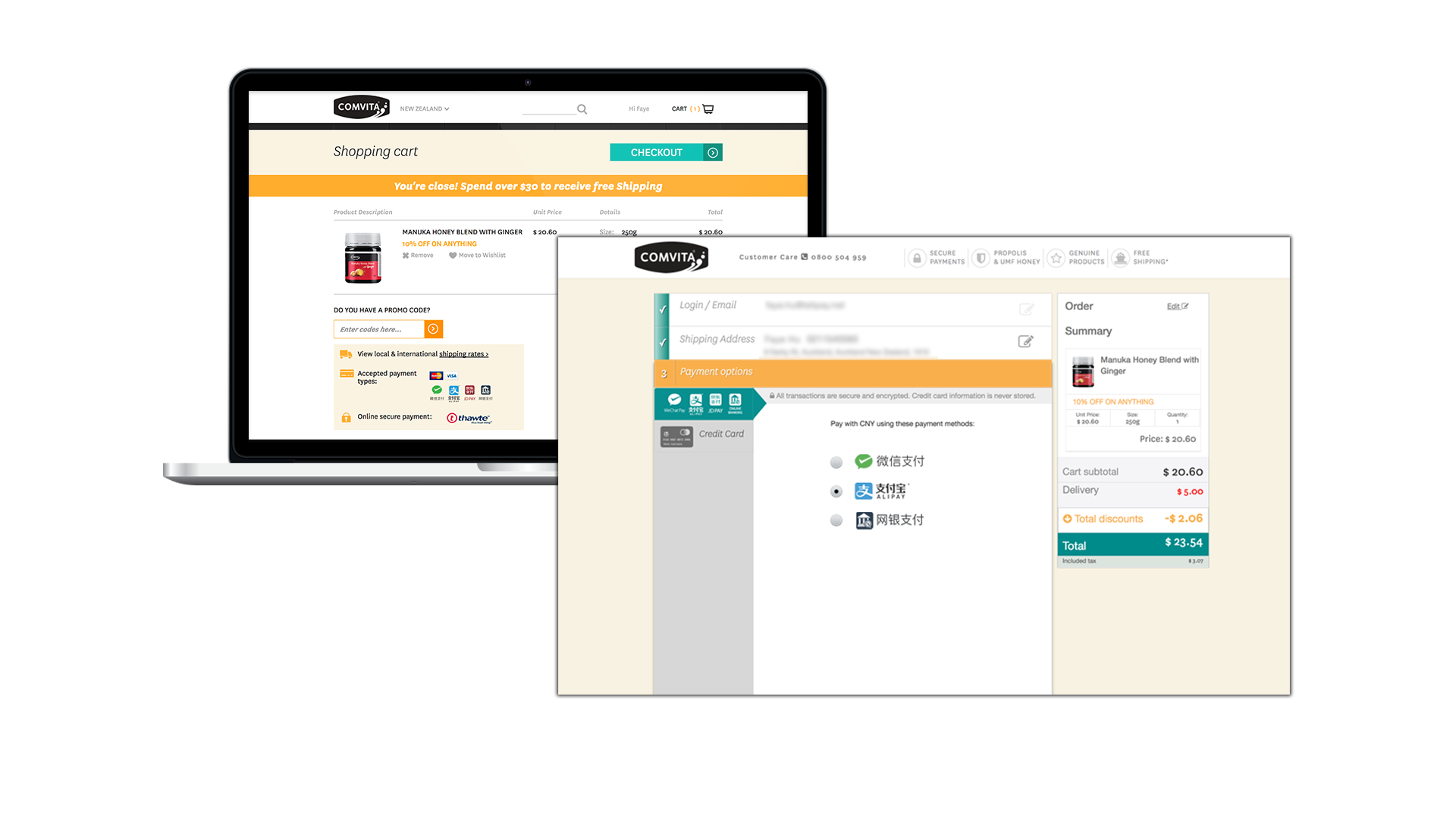Latipay Hosted Online
Tips: Get your Wallet ID, User ID and API key via Latipay Merchant Portal > WALLETS > ACTION(on the right side of the corresponding wallet) > Settings > Integration parameters
Tips: Create a minimum amount product (e.g. $ 0.01 NZD/AUD) for testing.
Summary
The Online / E-Commerce API is an independent Hosted Payments Page solution provided by Latipay. The page provides a solution for capturing WeChat/ Alipay securely without exposing the merchant to sensitive financial data. This Hosted API provides merchants with a secure and versatile solution for online payments and enables payments by redirecting users to a Latipay Hosted Payment Page. A real-time confirmation notification of payment from Latipay will be sent to the merchants in the form of a callback notification. These notifications are handled effectively and sent to an allocated callback_url in less than 30s. Merchants also can track payment status through the Latipay Order Query API. More available from the Merchant and Transaction portals of Latipay.
Available Payment Methods
- Alipay (Alipay website payment page)
- WeChat Pay (Latipay hosted payment page)
- NZ Banks
- PayID (Australia only)
- Unionpay Upop
Relevant Products
- E-commerce Website
How it works?
Alipay
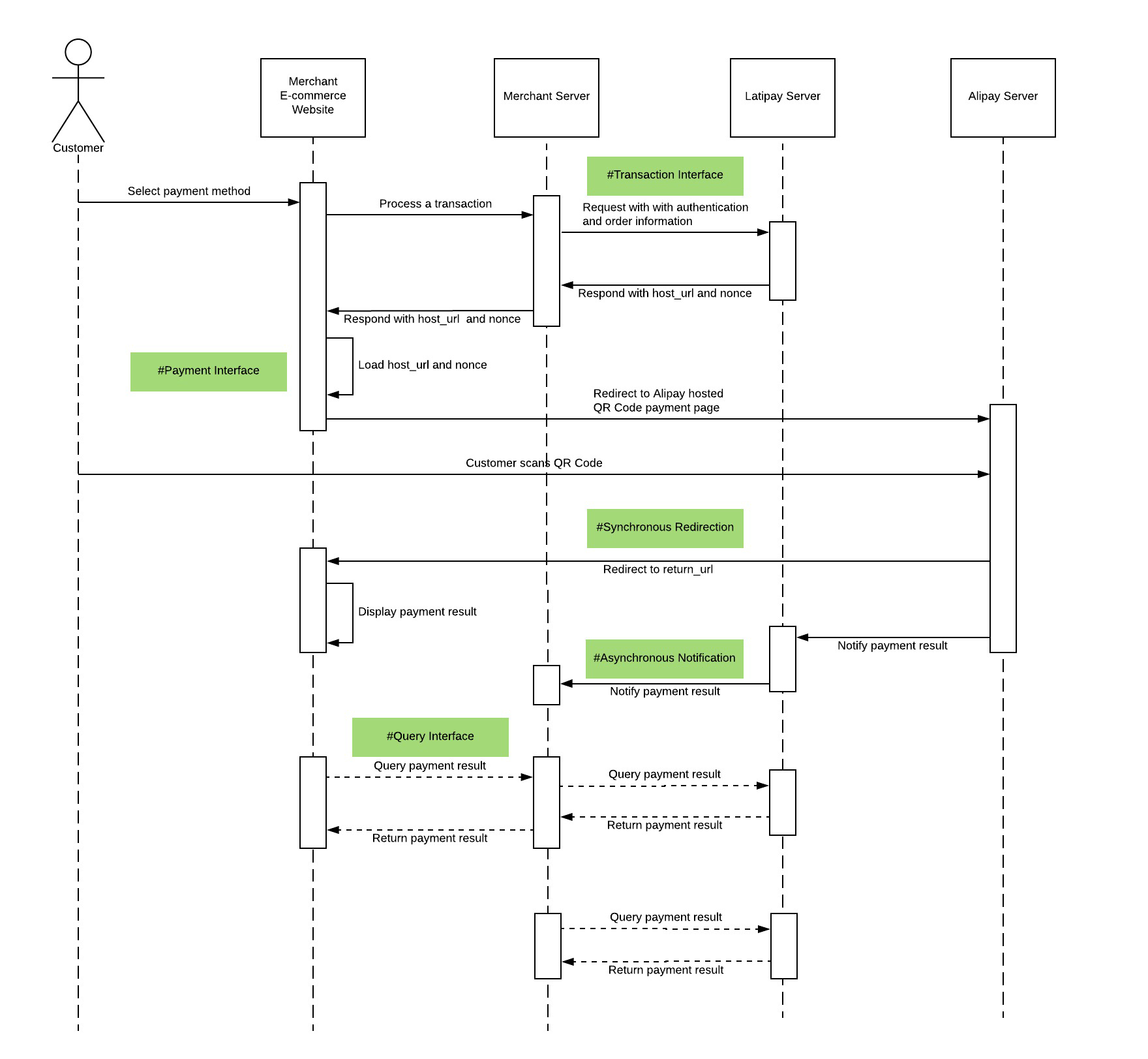
Wechat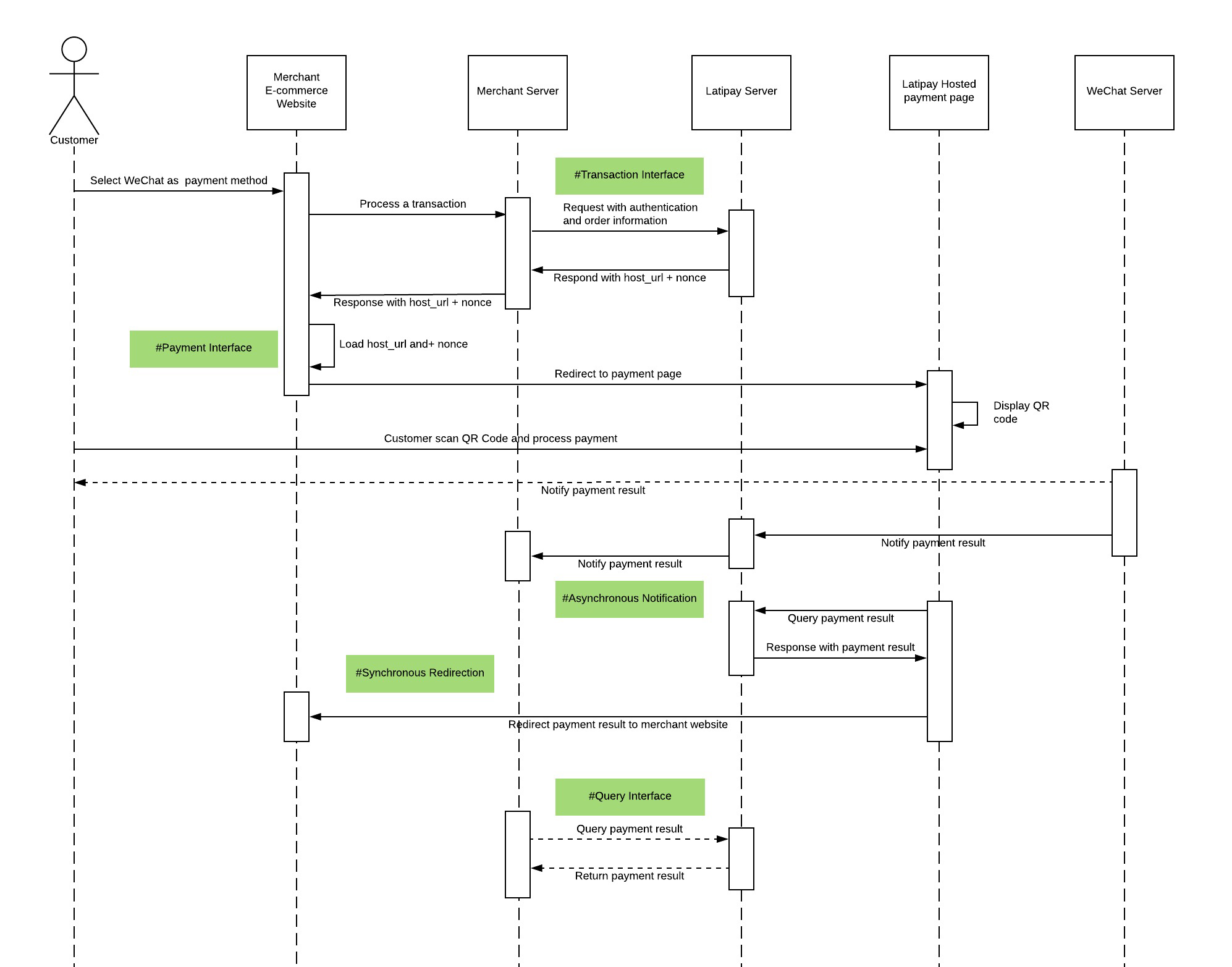
NZ Banks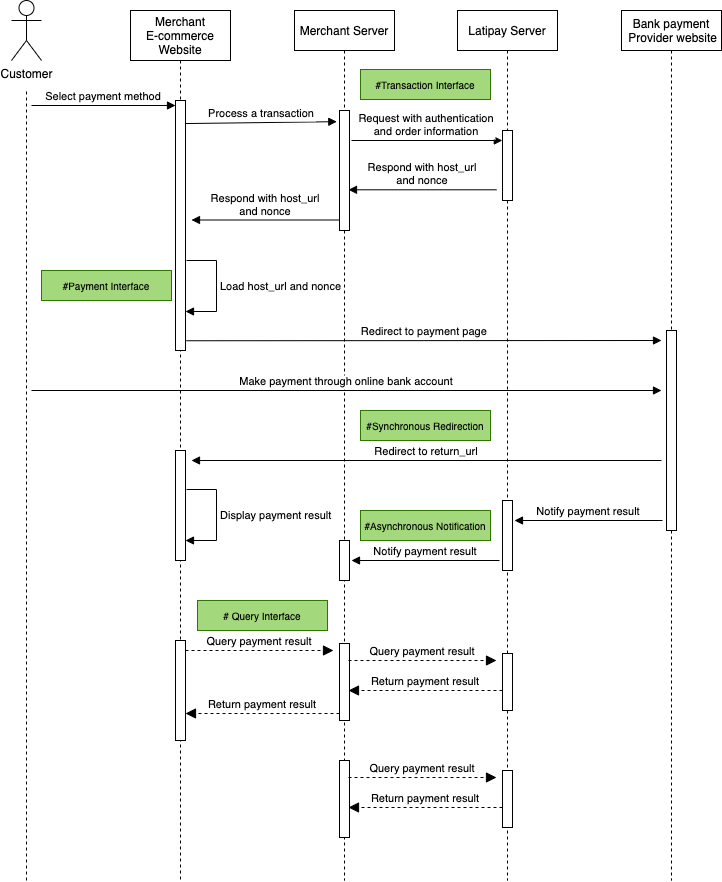
PayID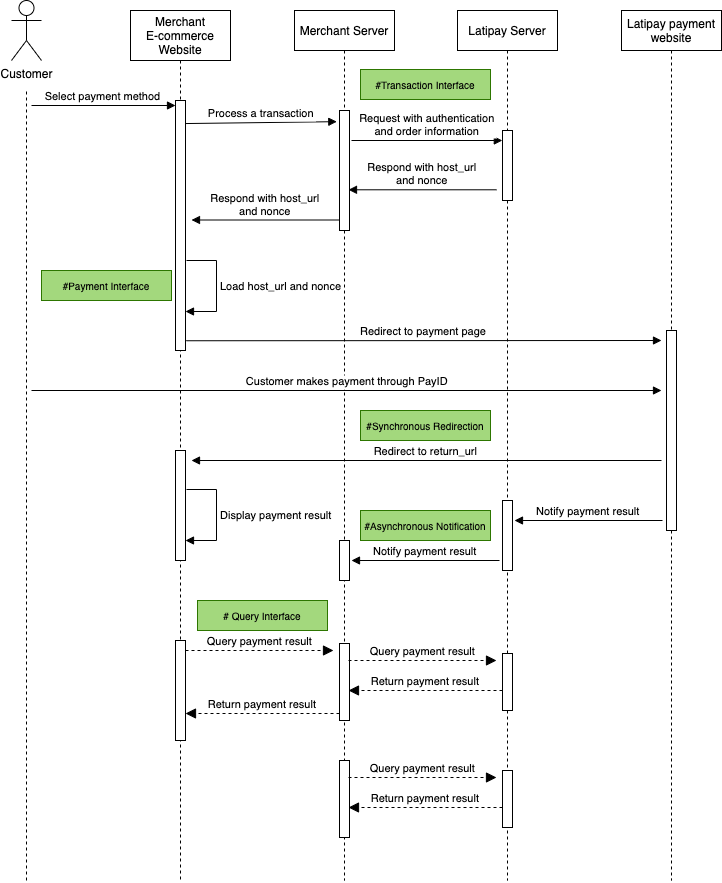
Payment Scenarios
- The payment scenarios are basing on the customer using Latipay payment services by
PC browser.
Merchant website checkout page
Alipay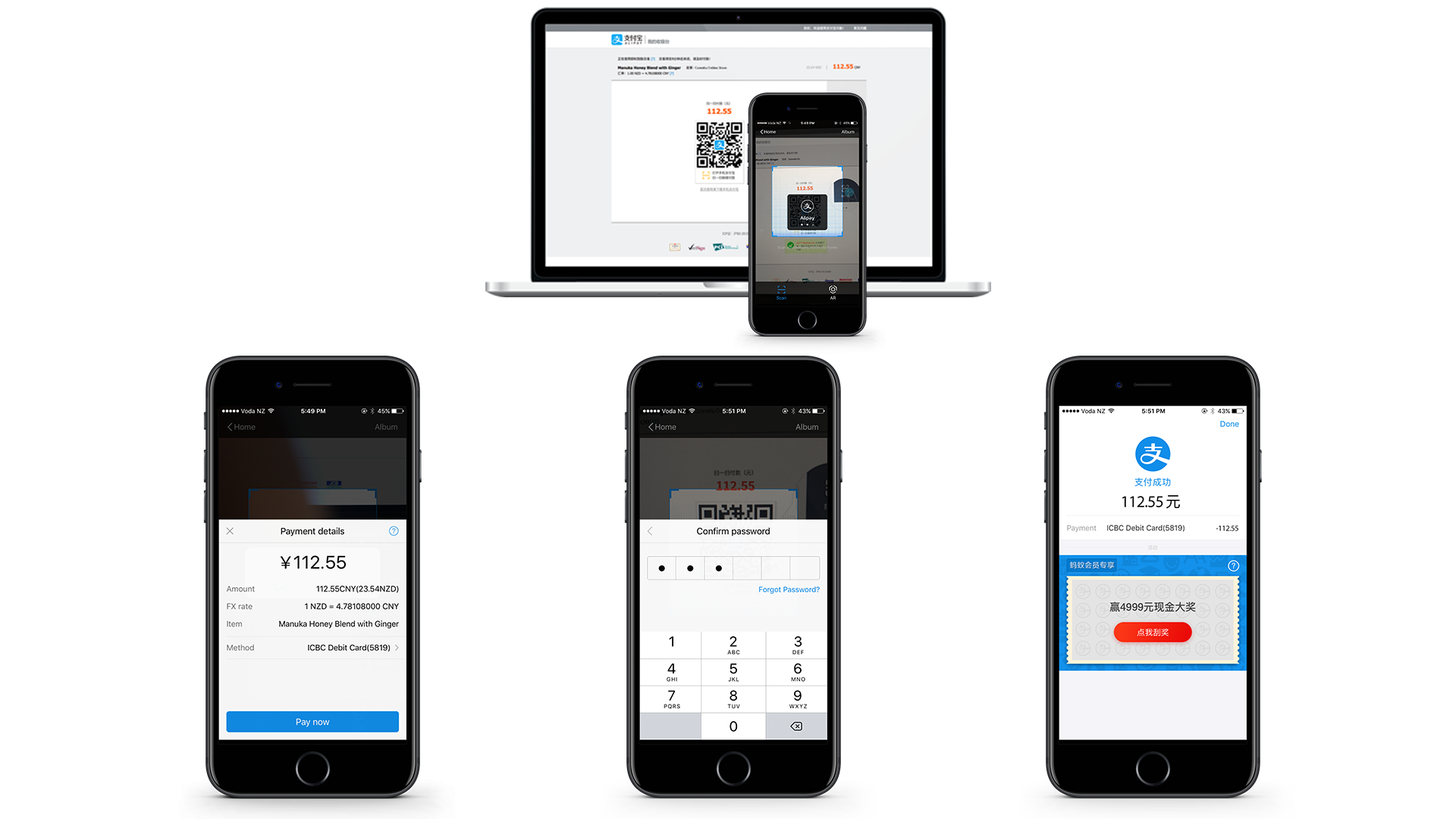
WeChat Pay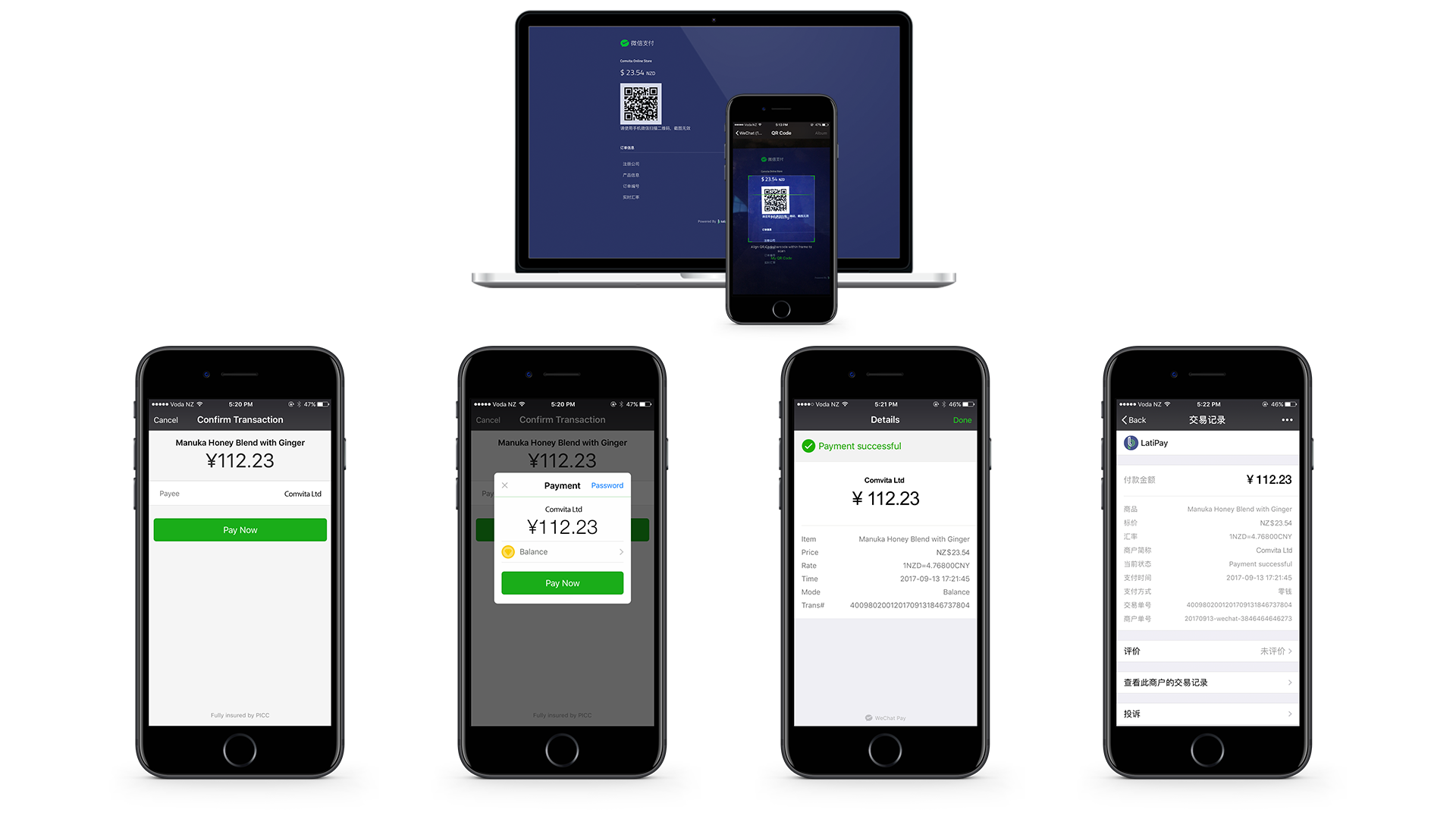
NZ banks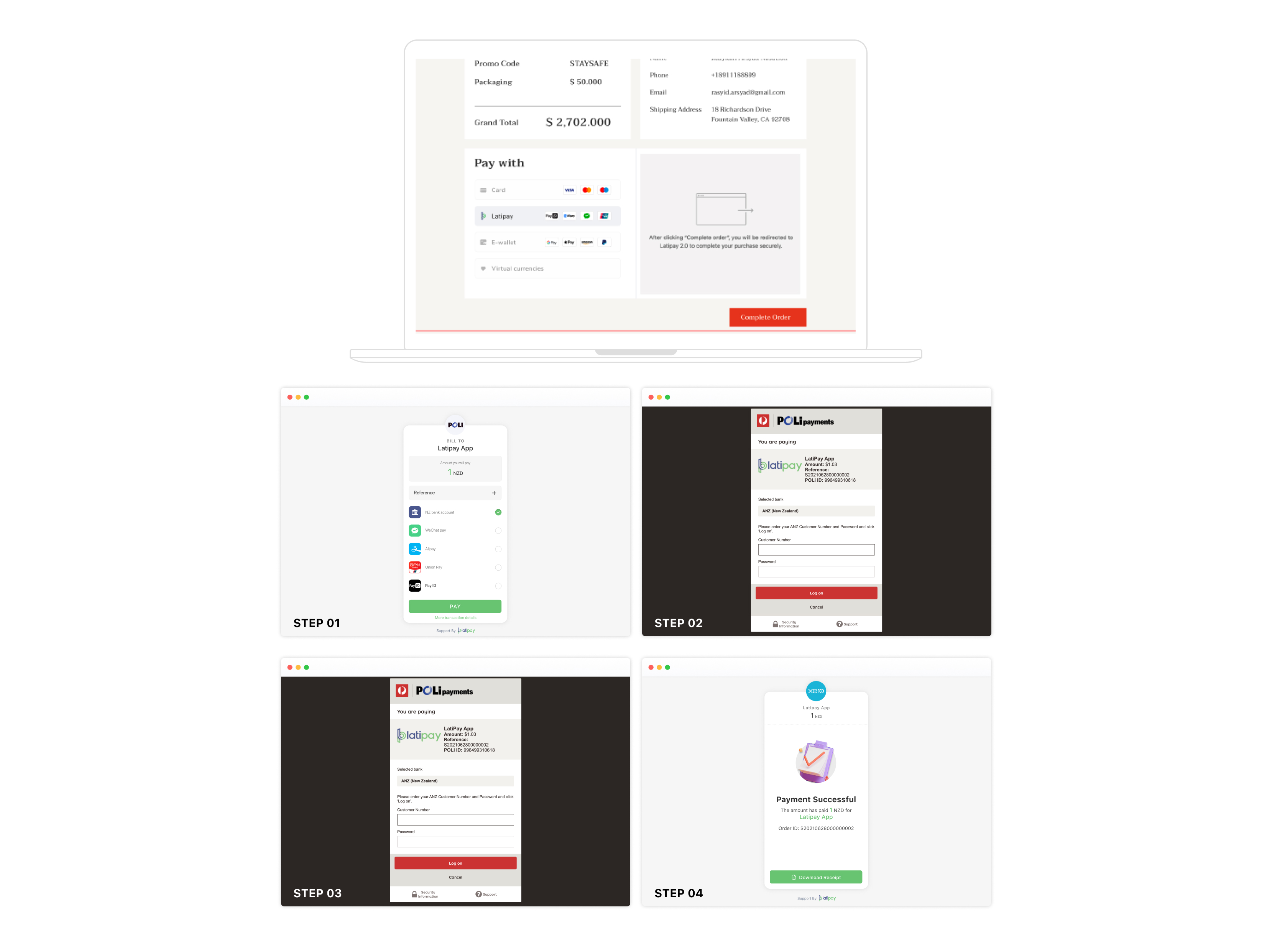
- The payment scenario is basing on the customer using Latipay payment services by
Mobile browser, Such as Safari in iPhone.
Alipay
The mobile browser Safari will try to launch Alipay app to make the payment. But Wechat App does not support launch from mobile browsers.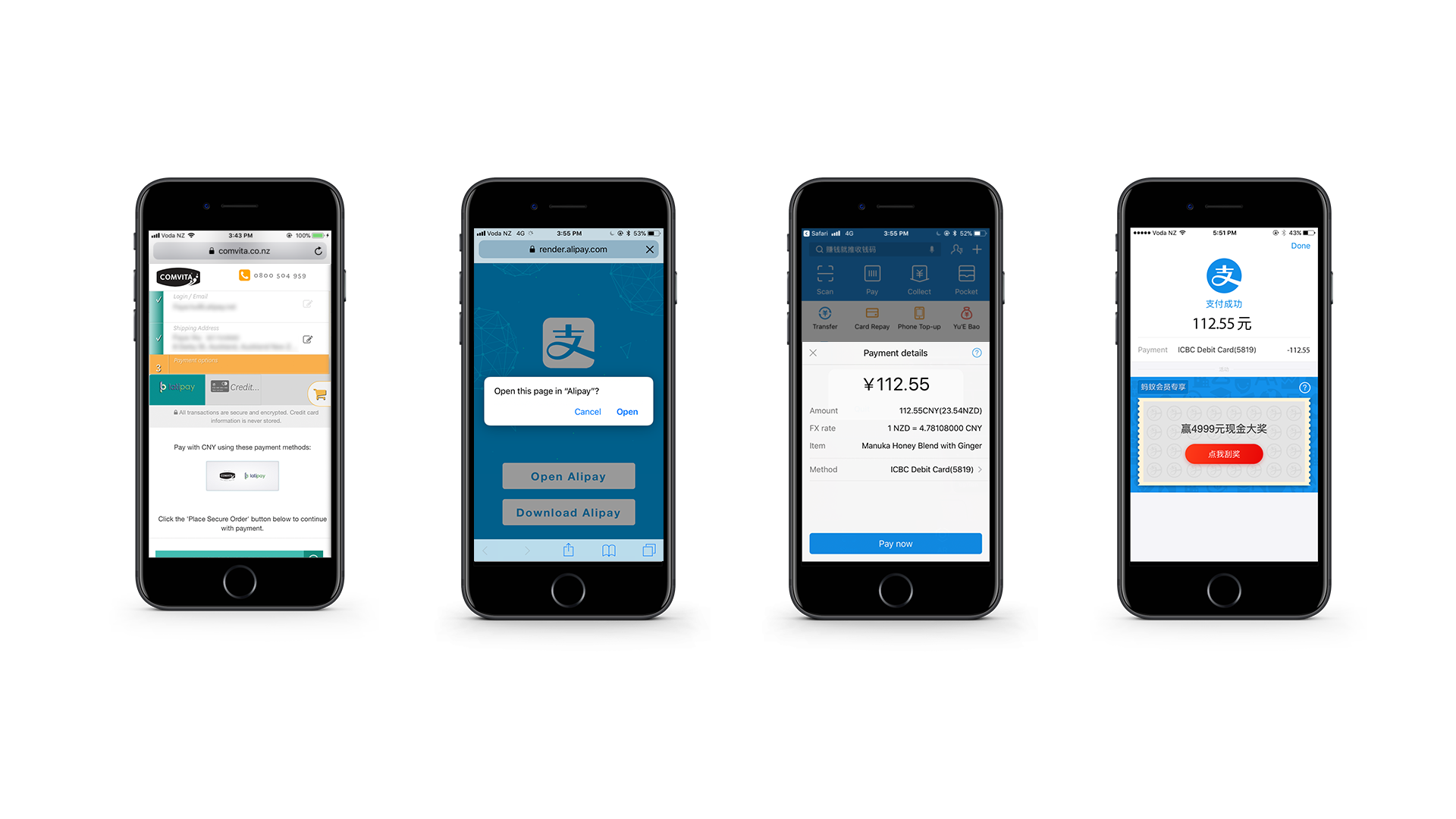
PayID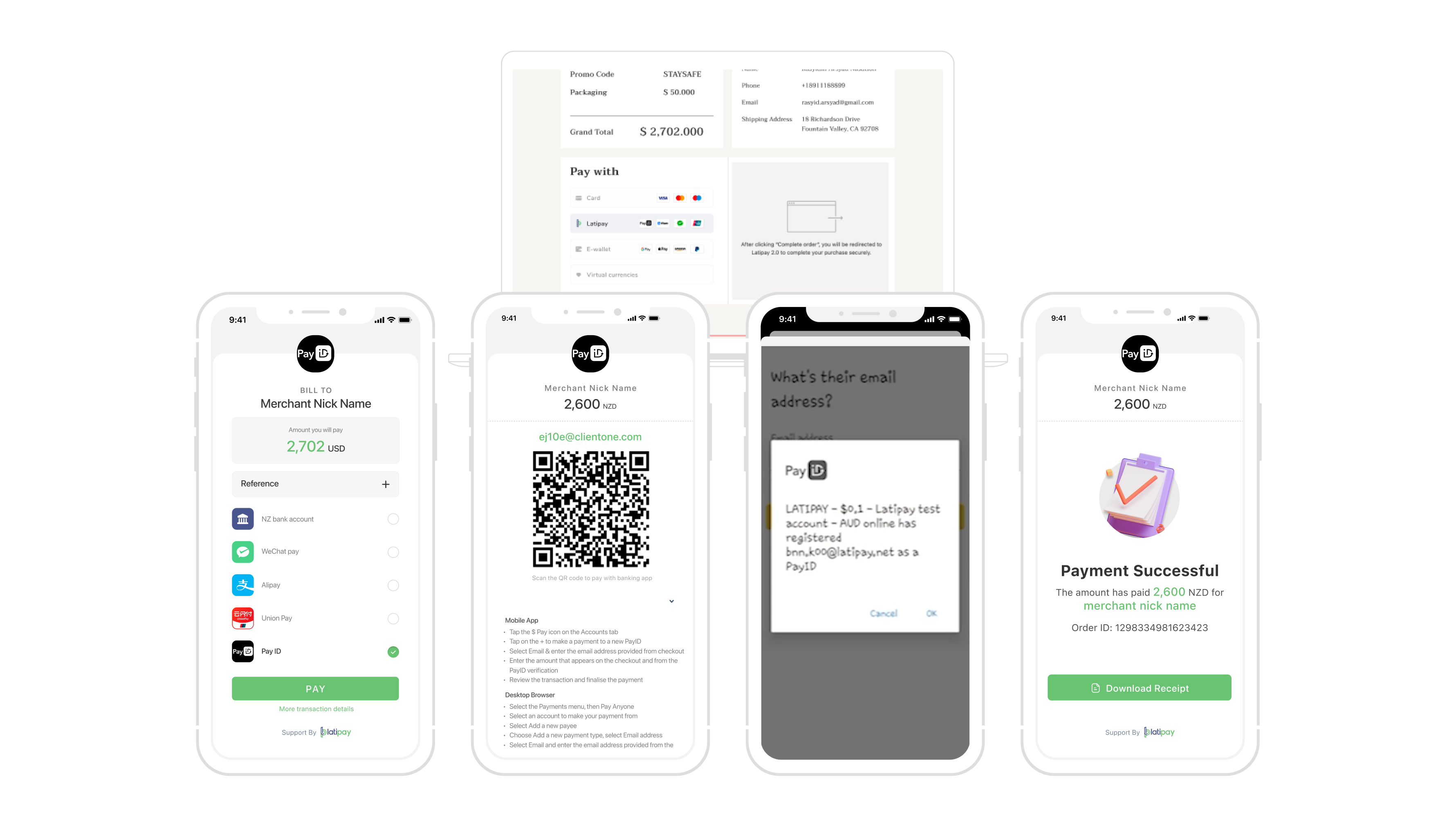
NZ banks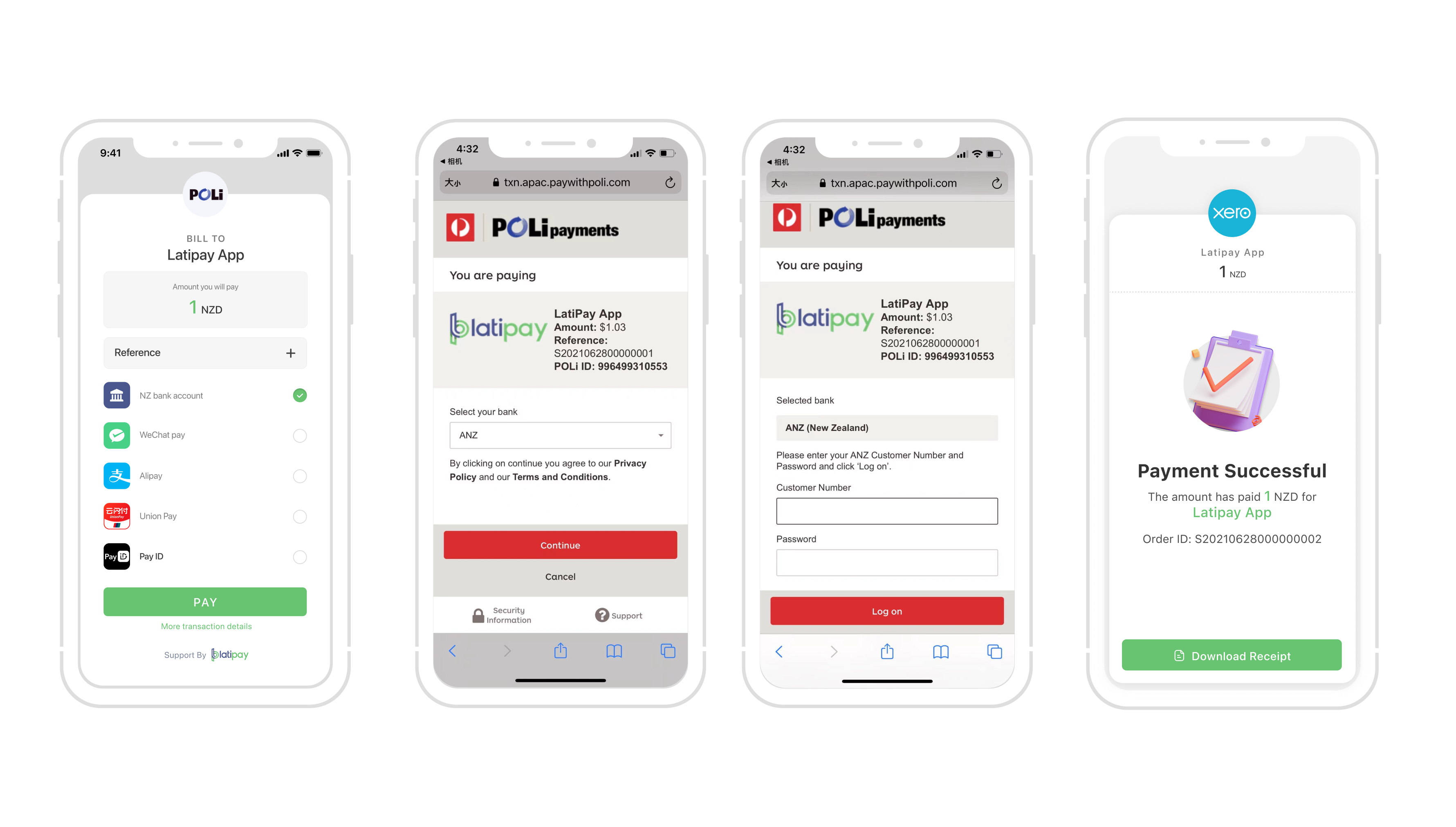
- The payment scenario is basing on the customer using Latipay payment services by
Embedded browser in Wechat App or Alipay app.
Alipay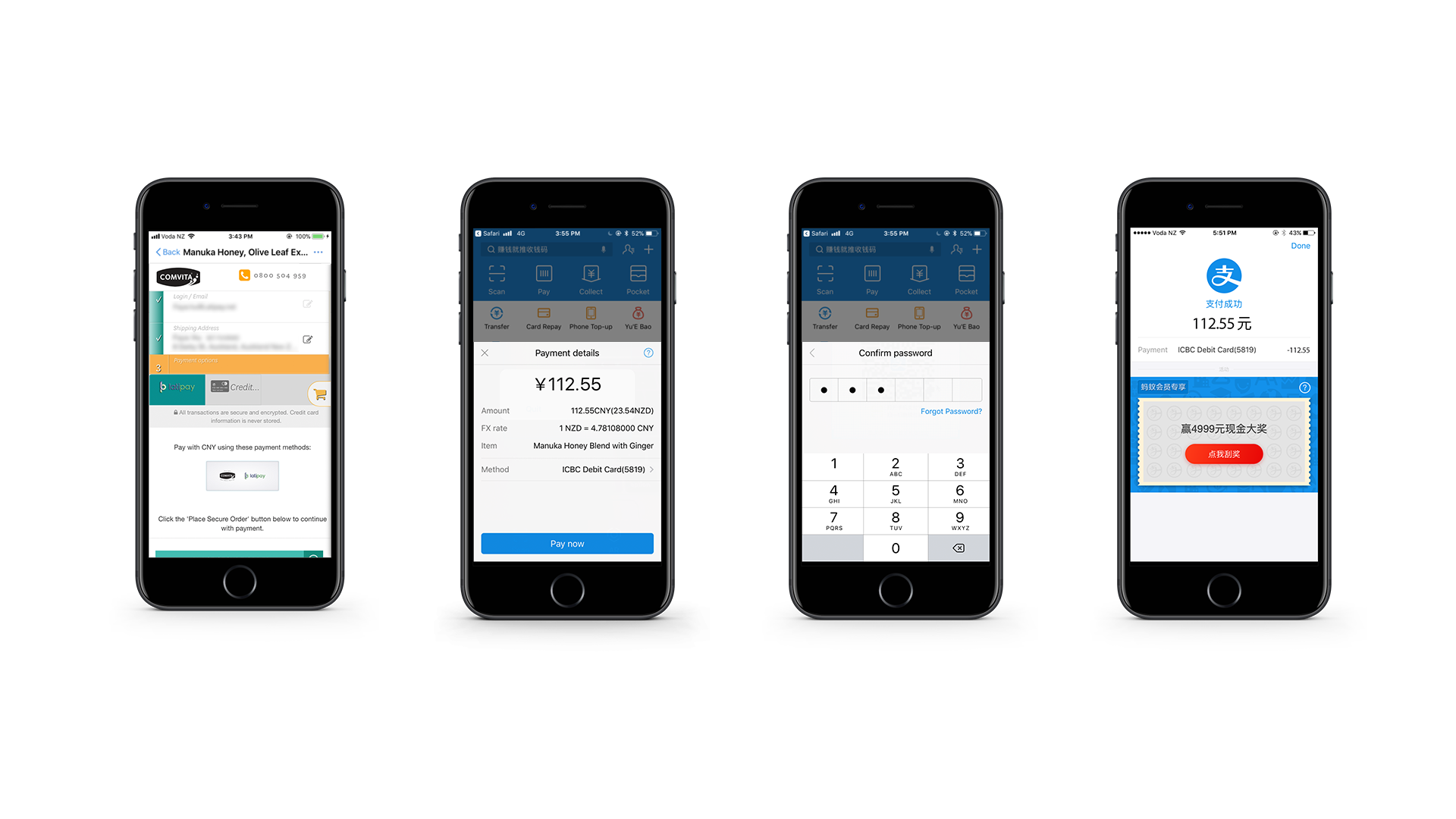
WeChat Pay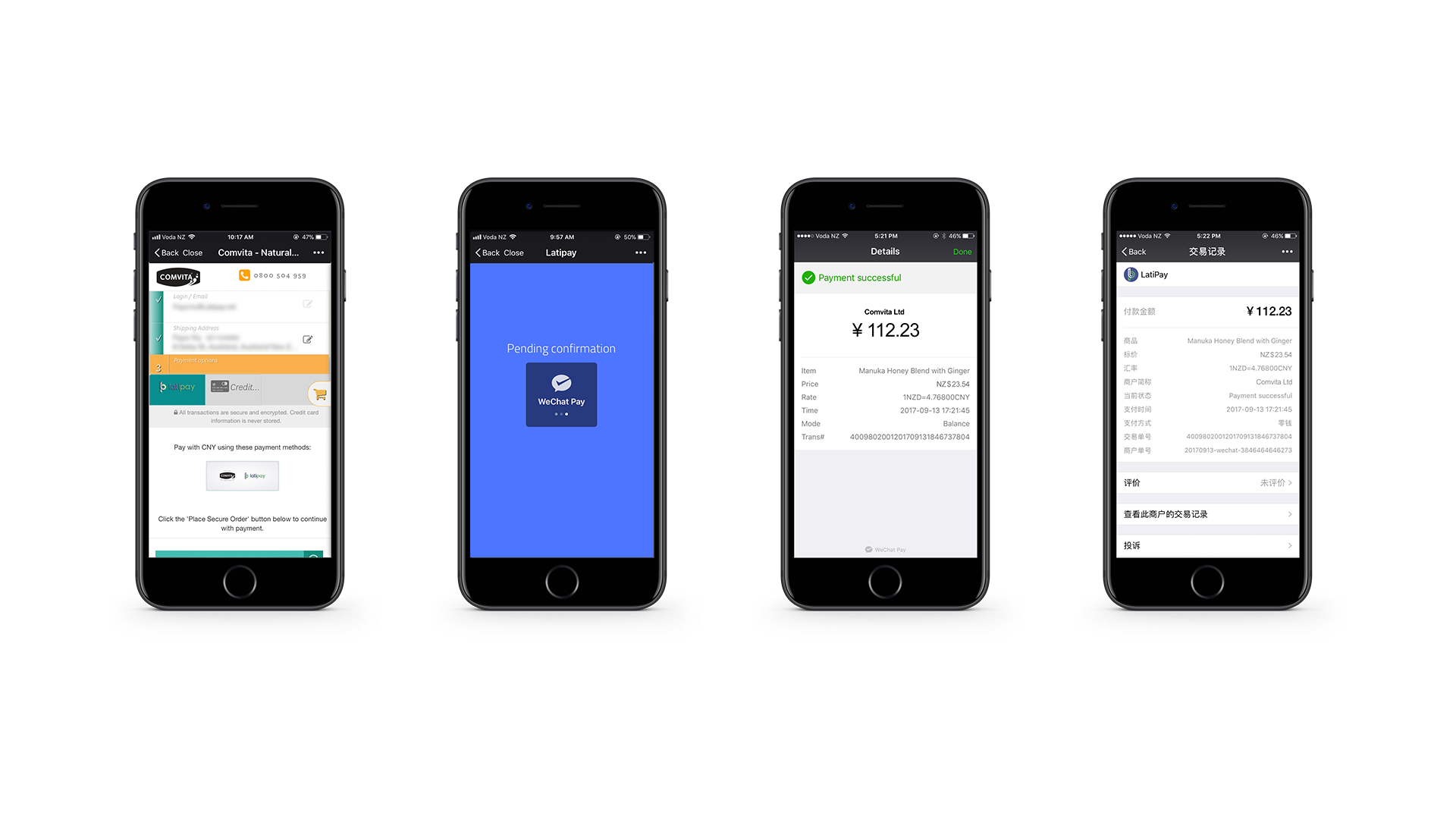
API Details
1 - Latipay Transaction Interface
1 | POST https://api.latipay.net/v2/transaction |
- Attributes
| Name | Type | Description | Optional |
|---|---|---|---|
| user_id | String | The Latipay user account which is using for processing the transactions. | NO |
| wallet_id | String | The wallet ID that using for online transactions. | NO |
| payment_method | String | The payment methods can be wechat, alipay, moneymore, polipay, payid, upi_upop or coin_payments. |
NO |
| amount | String | A decimal amount. | NO |
| return_url | String | The URL of the landing page where the customer will be directed to after payment when successful or failed. | NO |
| callback_url | String | Merchant web server’s URL that the payment result will send to. | NO |
| backPage_url | String | A back link show on Latipay’s payment page. Customer can back to merchant’s website with this link. | YES |
| merchant_reference | String | A unique id identifying the order in Merchant’s system. |
NO |
| ip | String(16) | The customer’s IPv4 address | NO |
| version | String | The latest version of the Latipay platform which must be "2.0" |
NO |
| product_name | String | The name of the product or service being sold. | No |
| signature | String | The SHA-256 HMAC API signature. |
NO |
Extract Attributes (for WeChat)
| Name | Type | Description | Optional |
|---|---|---|---|
| present_qr | String | Must be "1", to show a Latipay hosted page which presenting QR code waiting for scanning. It only works outside of Wechat App, such as PC browser. |
NO |
Example
1 | { |
- SHA-256 HMAC Signature Try your signature online
Rearrange all parameters alphabetically (except parameters with value of null or empty string) and join them with &, and concat the value of api_key in the end.
JS code example:
1 | Object.keys(data) |
Example
1 | message: amount=120.00&callback_url=https://merchantsite.com/confirm&ip=122.122.122.1&merchant_reference=dsi39ej430sks03&payment_method=alipay&product_name=Pinot Noir, Otago&return_url=https://merchantsite.com/checkout&user_id=U000334333&version=2.0&wallet_id=W00000001111222333 |
- Response
1 | { |
| Name | Type | Description |
|---|---|---|
| code | Int | 0 means success. |
| host_url | String | A URL will direct customer to finish the payment. |
| nonce | String | The transaction nonce must be appended to the host_url. Please make sure it always be fresh, Do not save it for using later. |
| signature | String | The SHA-256 HMAC API signature. |
Signature in Response
We are highly recommeding you to verify the signature in merchant’s webserver to ensure the security.
1 | message: nonce + host_url |
2 - Latipay Payment Interface
Loading the URI in PC browser, mobile browser or Alipay/ WeChat’s embedded browser.1
{host_url}/{nonce}
If it’s PC browser, you can load this url in current window or new window. But if it’s mobile browser or inside of Alipay or Wechat, please load the url in this or similar way: window.location.href={host_url}/{nonce}, so the window will be redirected to payment gateway to finish the payment.
Example
1 | https://pay.latipay.net/pay/7d5a88119354301ad3fc250404493bd27abf4467283a061d1ed11860a46e1bf3 |
3 - Asynchronous Notification
Asynchronous Notification is a re-try mechanism to ensure the notification has been updated to the merchant’s web server. There is no times limitation until it returns an indicating sent text to Latipay. The time interval of this notification is about 30 seconds.
1 | POST merchant's callback_url |
The status of response must be 200, the body of response must be the string sent
Attributes
| Name | Type | Description |
|---|---|---|
| merchant_reference | String | A unique id identifying the order in Merchant’s system. |
| order_id | String | A unique transaction identifier generated by Latipay. |
| currency | String | The currency code of the transaction. |
| amount | String | A decimal amount. |
| payment_method | String | The payment methods can be wechat,alipay,polipay,payid, or upi_upop. |
| status | String | Depending on the payment method, the status of the transaction can be pending, canceled, rejected, paid, or failed. |
| pay_time | String | The payment time of the transaction processed. Latipay uses UTCas default timezone. UTC/GMT+08:00 |
| signature | String | The SHA-256 HMAC API signature. |
Extra attribute for payid:
| Name | Type | Description |
|---|---|---|
| message | String | If the status is rejected, it will display the reason. |
| payId | String | Related PayID. |
| blockData | String | If the status is rejected due to a prohibited reference, this field will return the specific reference that caused the block. |
Example
1 | merchant_reference=dsi39ej430sks03&order_id=2017232323345678&amount=120.00¤cy=NZD&payment_method=alipay&pay_time=2017-07-07%2010%3A53%3A50&status=paid&signature=840151e0dc39496e22b410b83058b4ddd633b786936c505ae978fae029a1e0f1 |
SHA-256 HMAC Signature1
2message: merchant_reference + payment_method + status + currency + amount
secret: api_key
Example
1 | message: dsi39ej430sks03alipaypaidNZD120.00 |
Expected response
1 | sent |
4 - Synchronous Redirection
This redirection only happens in Wechat pay’s embedded browser and OnlineBank. For Alipay, it only happens in PC browser, not in Alipay app. This api being called does not mean the payment is successful. Do not relay on the value of status in parameters, you need check it from your own server
There is a sync and front-end payment result redirection sent from Latipay to merchant after the payment is done.
1 | Redirect merchant's return_url |
| Name | Type | Description |
|---|---|---|
| merchant_reference | String | A unique id identifying the order in Merchant’s system. |
| payment_method | String | The payment methods can be wechat, alipay or onlineBank. |
| status | String | The status of the transaction can be paid, or cancel_or_fail(only for wechat). |
| currency | String | The currency code of the transaction. |
| amount | String | A decimal amount. |
| signature | String | The SHA-256 HMAC API signature. |
Example
1 | https://www.merchant.com/latipay?merchant_reference=dsi39ej430sks03&payment_method=alipay&status=paid¤cy=NZD&amount=100.00&signature=14d5b06a2a5a2ec509a148277ed4cbeb3c43301b239f080a3467ff0aba4070e3 |
SHA-256 HMAC Signature
Merchant frontend need to validate the signature for protecting against malicious requests.
1 | message: merchant_reference + payment_method + status + currency + amount |
5 - Payment Result Interface
All customers can send requests to query payment status with merchant order id(that should be unique id for the merchant) as merchant_reference by HTTP GET request.
1 | GET https://api.latipay.net/v2/transaction/{merchant_reference} |
Parameters
| Name | Type | Description | Optional |
|---|---|---|---|
| merchant_reference | String | A unique id identifying the order in Merchant’s system. |
NO |
| user_id | String | The user account you want to use to process the transaction. | NO |
| is_block | Int | Optional parameter, 1 means the http request use long poolling mechanism, the timeout is 180s. |
YES |
| signature | String | The SHA-256 HMAC API signature. |
NO |
- SHA-256 HMAC Signature Try your signature online
Rearrange all parameters alphabetically (except parameters with value of null or empty string) and join them with &, and concat the value of api_key in the end.
JS code example:
1 | Object.keys(data) |
1 | Message: merchant_reference=6000324&user_id=U000000013111222333 |
Example
1 | GET https://api.latipay.net/v2/transaction/1289323A122DB?user_id=U000334333&signature=14d5b06a2a5a2ec509a148277ed4cbeb3c43301b239f080a3467ff0aba4070e3 |
Response
| Name | Type | Description |
|---|---|---|
| merchant_reference | String | A unique id identifying the order in Merchant’s system. |
| currency | String | The currency code of the transaction. |
| amount | Number | A decimal amount. |
| payment_method | String | The payment method used. Possible values are alipay and wechat. |
| status | String | The status of the transaction. Possible values are: pending, paid, or failed. |
| pay_time | String | Show the payment time of the transaction order. UTC/GMT+08:00 |
| order_id | String | A unique transaction identifier generated by Latipay. |
| signature | String | The SHA-256 HMAC API signature. |
Example Response
1 | { |
Signature in Response
For security reasons, we highly recommend you verify the signature in the response.
1 | message: merchant_reference + payment_method + status + currency + amount |
Example Signature
1 | message: dsi39ej430sks03alipaypaidNZD120.00 |
Additional Note
In the context of NPP (PayID), the system establishes an Expiry Date for each PayID. Upon expiration, the system automatically updates the status of pending transactions to failed and disables the PayID. For customized Expiry Date requests, please contact your Latipay’s representative.
6 - Refund
1 | POST https://api.latipay.net/refund |
Parameters
| Name | Type | Description |
|---|---|---|
| user_id | String | The user account you want to use to process the transaction. |
| order_id | String | A unique transaction identifier generated by Latipay. |
| refund_amount | String | A decimal amount. e.g. “9.99”, cannot be in excess of order amount. |
| reference | String | Notes about this refund. |
| signature | String | The SHA-256 HMAC API signature. |
Example
1 | { |
SHA-256 HMAC Signature
Rearrange all parameters alphabetically (except parameters with value of null or empty string) and join them with &, and concat the value of api_key in the end.
JS code example:
1 | Object.keys(data) |
Example
1 | message: order_id=23479798sdf7987234&reference=notes about this refund&refund_amount=120.00&user_id=U000334333111222333 |
Response
| Name | Type | Description |
|---|---|---|
| code | String | The response code of payment, 0 or Error Code, 0 means no error happened. |
| message | String | The response message of payment interface. |
Example Response
1 | { |

